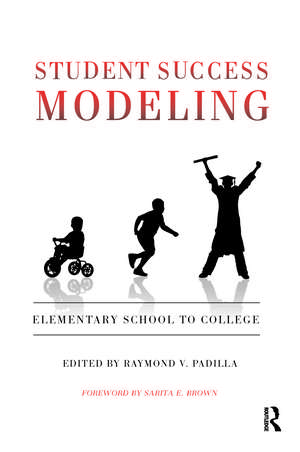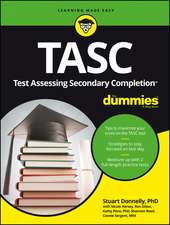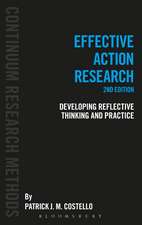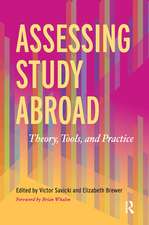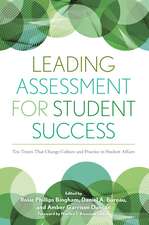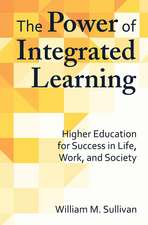Student Success Modeling: Elementary School to College
Editat de Raymond V. Padillaen Limba Engleză Paperback – 6 noi 2008
Preț: 260.56 lei
Nou
Puncte Express: 391
Preț estimativ în valută:
49.87€ • 54.19$ • 41.92£
49.87€ • 54.19$ • 41.92£
Carte tipărită la comandă
Livrare economică 21 aprilie-05 mai
Preluare comenzi: 021 569.72.76
Specificații
ISBN-13: 9781579223274
ISBN-10: 1579223273
Pagini: 236
Dimensiuni: 152 x 229 x 20 mm
Greutate: 0.36 kg
Ediția:1
Editura: Taylor & Francis
Colecția Routledge
Locul publicării:Oxford, United Kingdom
ISBN-10: 1579223273
Pagini: 236
Dimensiuni: 152 x 229 x 20 mm
Greutate: 0.36 kg
Ediția:1
Editura: Taylor & Francis
Colecția Routledge
Locul publicării:Oxford, United Kingdom
Public țintă
PostgraduateCuprins
List of Figures; Acknowledgements; Foreword; Preface; 1. The Preoccupation with Student Outcomes; 2. Searching for Theory and Method; 3. Student Success in Elementary School—Mary Miller; 4. Student Success in a High Minority High School—Kimberly S. Barker; 5. Student Success in a Community College—Ralph Mario Wirth; 6. Student Success in an Hispanic Serving University—Raymond V. Padilla and George Norton; 7. Implementation Models; 8. Expanding the Conversation; Contributors; Index.
Notă biografică
Raymond V. Padilla is Professor, College of Education and Human Development, University of Texas at San Antonio. His most recent book is Debatable Diversity: Critical Dialogues on Change in American Universities. Sarita E. Brown is a Cofounder of Excelencia in Education.
Recenzii
"Focusing on the reasons for success in student performance rather than failure, Padilla (education and human development, U. of Texas at San Antonio) presents a framework for understanding student success and how it can be improved and replicated. He presents a general model and one for specific, local situations and how they have been applied in a minority high school, community college, and Hispanic-Serving University, and to compare high-performing and non- high-performing elementary schools. Chapters address the characteristics of students, teachers, and the school, its resources, and barriers to success. These chapters are based on the doctoral research of additional contributors who were Padilla's former students."
Book News Inc
“This book provides a new and much needed examination of college student success as a process that starts with elementary education, and requires specialized student expertise to overcome disadvantaging institutional structures and practices. What I find of greatest value about this book is the introduction of a model of student success that is sensitive to contextual circumstances and focuses on student agency to overcome barriers to their success. As Ray Padilla alludes, there are hundreds of correlational studies on pre-college characteristics as determinants of student success but we know very little about what goes on inside institutions that is enabling or disabling of students who lack the normative profile of the successful college student. Padilla’s model provides a critical perspective on student success: he takes it for granted that institutions are filled with visible and invisible obstacles that stand in the way of historically marginalized student populations. Accordingly, rather than asking the typical question: What student characteristics predict college success? He instead asks: What expertise do marginalized students possess that enables them to overcome institutional barriers to success?"
Estela Mara Bensimon, Professor of Higher Education in the division of Educational Policy and Administration, and Director of the Center for Urban Education
University of Southern California
“We welcome this book and the promise of the ideas and models offered to educators in our schools, colleges, and universities. With Student Success Modeling as a guide, educators will be able immediately to construct learning approaches that break through the limitations of current large scale assessments and build on all students’ potential for success.”
from the Foreword by Sarita E. Brown, President
Excelencia in Education
Book News Inc
“This book provides a new and much needed examination of college student success as a process that starts with elementary education, and requires specialized student expertise to overcome disadvantaging institutional structures and practices. What I find of greatest value about this book is the introduction of a model of student success that is sensitive to contextual circumstances and focuses on student agency to overcome barriers to their success. As Ray Padilla alludes, there are hundreds of correlational studies on pre-college characteristics as determinants of student success but we know very little about what goes on inside institutions that is enabling or disabling of students who lack the normative profile of the successful college student. Padilla’s model provides a critical perspective on student success: he takes it for granted that institutions are filled with visible and invisible obstacles that stand in the way of historically marginalized student populations. Accordingly, rather than asking the typical question: What student characteristics predict college success? He instead asks: What expertise do marginalized students possess that enables them to overcome institutional barriers to success?"
Estela Mara Bensimon, Professor of Higher Education in the division of Educational Policy and Administration, and Director of the Center for Urban Education
University of Southern California
“We welcome this book and the promise of the ideas and models offered to educators in our schools, colleges, and universities. With Student Success Modeling as a guide, educators will be able immediately to construct learning approaches that break through the limitations of current large scale assessments and build on all students’ potential for success.”
from the Foreword by Sarita E. Brown, President
Excelencia in Education
Descriere
This book focuses on one of the key questions in education: What determines a student’s success?Based on twenty years of work on student success, Ray Padilla here presents two related models he has developed that both provide a framework for understanding success and indicate how it can be enhanced and replicated.
